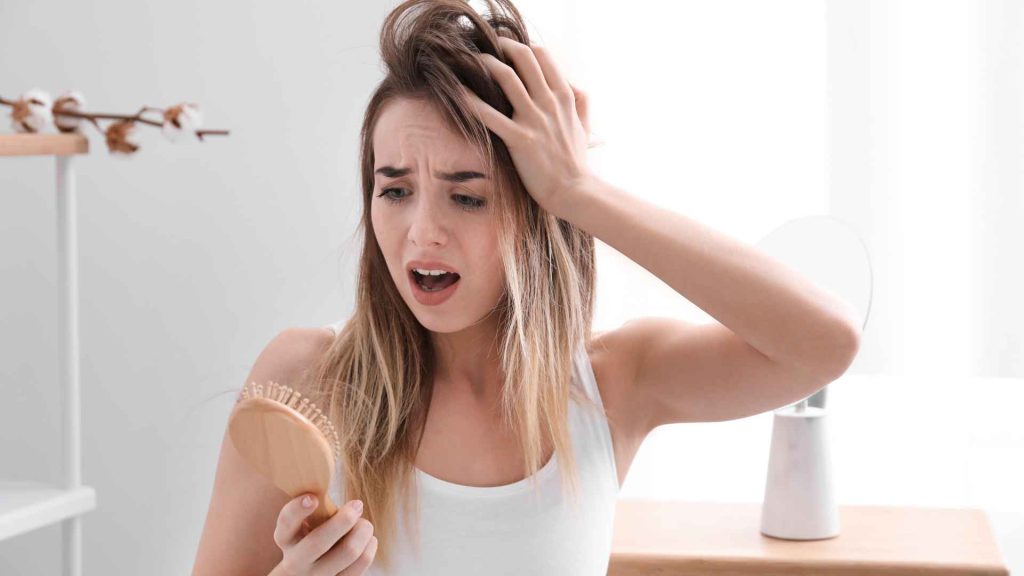Hair loss is a serious and common problem that affects millions of people worldwide. While there are many causes of hair loss, including genetics, hormones, and autoimmune conditions, many don’t realize that smoking is also a potential contributor.
The link between smoking and hair loss is not fully understood, but it’s believed that smoking can cause a decrease in circulation to the scalp, which can lead to thinning hair. In addition, smoking can also damage the hair follicles, making them less effective at producing healthy, strong hair.
Smoking can also cause an imbalance of hormones, which is a known cause of hair loss. Lastly, smoking has been linked to an increase in inflammation, which can damage the hair follicles, leading to hair loss.
The good news is that quitting smoking can help reverse the effects of hair loss. If you’re a smoker and are experiencing hair loss, quitting smoking may be an effective way to help restore your hair.
Although the connection between smoking and hair loss is not fully understood, it’s clear that smoking is a potential contributor to thinning hair. If you’re a smoker and are experiencing hair loss, quitting smoking is the best way to potentially reverse the effects.
Smoking and Hair Loss: How Does It Happen?
Smoking is a habit that can have a number of adverse effects on your health, including causing hair loss. Chronic smoking can damage hair follicles, leading to thinning hair and even balding. When you smoke, the toxins from the cigarettes can enter your bloodstream, where they can damage the hair follicles. This damage can cause the follicles to produce weaker hairs, which can lead to thinning or balding. Smoking also reduces circulation, meaning that the hair follicles don't get the nutrients and oxygen they need to stay healthy.
Smoking can also cause hormonal imbalances which can lead to hair loss. It has been linked to high levels of testosterone, which can lead to male pattern baldness. It can also increase the stress hormone cortisol, which can affect the hair cycle and cause more hair to fall out.
The good news is that quitting smoking can help reverse the effects of hair loss. It can take some time for the hair follicles to heal and for healthy hair to grow back, but it is possible. To help speed up the process, it is important to eat a healthy diet and to take care of your scalp.
If you are a smoker and you are concerned about hair loss, the best thing you can do is to quit. Taking care of your hair is an important part of taking care of your overall health.
Protect Your Hair from Smoking Damage
Smoking is a habit that can damage more than just your lungs. It can also damage your hair, leaving it dry and prone to breakage. To protect your hair from the negative effects of smoking, there are a few steps you can take.
First, if you're a smoker, try to limit your exposure to secondhand smoke. Secondhand smoke can be just as damaging to your hair as smoking directly.
Second, use a deep conditioning treatment once a week. This will help to nourish and hydrate your hair, which will help to counteract the drying effects of smoking.
Third, avoid styling products that contain alcohol or other chemicals that can dry out your hair. Instead, use natural oils and butters to nourish and protect it.
Finally, be sure to drink plenty of water and eat a healthy diet to keep your hair healthy. A balanced diet with plenty of fruits and vegetables will help to promote healthy hair growth.
By following these simple steps, you can protect your hair from the damage of smoking and keep it looking its best.
Can Quitting Smoking Reverse Hair Loss?
Smoking has long been known to have a negative impact on the body, including hair loss. But can quitting smoking reverse the effects and restore hair growth?
The answer is yes. Smoking has been linked to hair loss in both men and women. Since smoking is a direct source of toxins, it can increase inflammation and damage the hair follicles, resulting in hair loss.
When you quit smoking, your body begins to heal and your hair follicles can start to recover. The regeneration process can take several months, depending on the severity of the hair loss.
It’s important to keep in mind that quitting smoking does not guarantee that hair loss will reverse. You may still experience some hair loss due to other factors, such as genetics or age-related hair thinning.
It is also important to note that quitting smoking alone is not enough to restore hair growth. A healthy diet and lifestyle are essential to keep your hair and scalp healthy. This includes eating a balanced diet with plenty of fruits and vegetables, exercising regularly, and managing stress.
Quitting smoking can be an important step in reversing hair loss, but it should be part of a comprehensive health plan. With the right approach, you can improve your overall health and help your hair to regrow.
Click here for more information: https://tayloani.com/blogs/news/hair-loss-and-smoking-the-surprising-link-between-your-habits-and-your-hair
